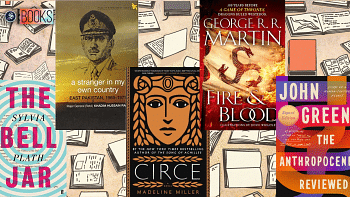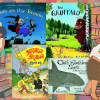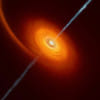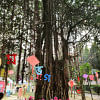The tiny space between science and literature

This particular story, although about books, does not start with a book. Rather, and of all places, it begins with a TED talk. As a pre-teen moving into my teenage years, we didn't have a stable internet connection. There was a modem and all the inconveniences brought about by a modem—slow connectivity, limited usage, etc. It would take another couple of years for Youtube to become a staple in my life. But in the middle there, somewhere, I fell into the rabbit hole of listening to scientists explain fancy things to me in a language that was simple and not entirely unlike the books I was so used to reading. My life, at the time, revolved around two things, reading something that would scratch my brain the right way—and finding something to watch that would do the same.
All this brought me to Brian Greene, the renowned physicist, and his TED talk on String Theory. For about half an hour, I stayed glued to my seat and the screen, watching him break down the concept of string theory and discuss the idea of our universe consisting of 10 dimensions. It was fascinating, sure, but it wasn't enough. So I sought the name out, and discovered The Elegant Universe. I began reading, not because of any desire to learn more about science—learning science, after all, meant shoving my brain with information until it grew heavy and tiresome to carry around. I liked stories. Living, then, consisted of that simple fact. Living, then, might have been a little too passive. I was driven only by the desire to find a good story. I did not care what shape it took, nor did I ever care for structure in a story. Even as a child, the idea of a narrative felt like a flexible and malleable concept. If anything could be a story, a book with so many pages filled with text (even if it were about science) could be a story. And so I read The Elegant Universe.
And then I read The Fabric of the Cosmos.
And then I read Michio Kaku's Physics of the Impossible.
And at this point I think you can tell where this story is headed. But this isn't to say that reading science books had an impact that was immediate and profound. What I am trying to convey is that loving these books caused them to be integrated in the mundanity of my life. Over the next few years, I sought out more and more of these books about science written by scientists. I was enamored by the theories presented by Brian Greene that added a new layer to the already near incomprehensible complexity of the universe. I felt giddy at the prospect of 'multiverses' presented in Michio Kaku's Parallel Worlds. And then I moved beyond physics and read Dava Sobel's Longitude, and its account of the history of oceanic navigation and the creation of a timekeeper that allowed us to navigate oceans no matter how perilous they might seem. See, the thing about this hyper specific sub genre of books is that they, in many respects, serve the same purpose as history books. Not just that, they are also bridging the gap between storytelling and, well, science. My desire to find good stories to read never quite went away, and reading these books every time one struck my fancy only provided a new dimension to see the world through.
And I think that did cause some change. But growing to love something, and allowing that to change me is not immediate, it is not profound. Nor is it something caused just by reading a handful of books. Many events pile together, some fortunate, others not so, and what pans out is something you have to live with, irrespective of the outcome being desirable or not. I have often been asked why I chose to study Biochemistry, of all subjects, and while there are several answers to this, the truest answer comes from a book I read at some point before my A levels.
From a conversation with a friend of mine came the name Siddhartha Mukherjee, and with him came the name of one book in particular. That being The Gene: An Intimate History. It sounded intriguing enough, and enough was just about good enough to get me to read. So I read. And the first thing that struck me was the prologue, and two quotes that kick off the entire book. First, a line from The Odyssey that read, 'The blood of your parents is not lost in you'. Second, an excerpt from a Philip Larkin poem, "This Be The Verse". The excerpt read as thus:
They f*ck you up, your mum and dad.
They may not mean to, but they do.
They fill you with the faults they had
And add some extra, just for you.
What did any of this have to do with genes and biology was a question answered shortly upon continuing to read the book. For all intents and purposes, Mukherjee did not write The Gene for anyone who isn't interested in learning the history of the gene. But the more I read, the more certain I'd become that this book isn't really just about that. That's the focus, but the literature here had a clear theme in exploring how personality, trauma, disorders, and just about everything that causes us to live as humans are also passed down from generation to generation as strings of code deep within us made of nothing but atoms aligned in just the right ways in the universe's game of chance. We are nothing but a probabilistic miracle—and Siddhartha Mukherjee's prose explores that very concept in the context of not just medical science but his own life. My search for stories brought me here, to what was perhaps the most important thing I could read at that particular time. Living, then, along with the search for stories, did not feel as passive for once.
Raian Abedin is a poet, a student of Biochemistry, and a contributor to The Daily Star.

 For all latest news, follow The Daily Star's Google News channel.
For all latest news, follow The Daily Star's Google News channel. 











Comments